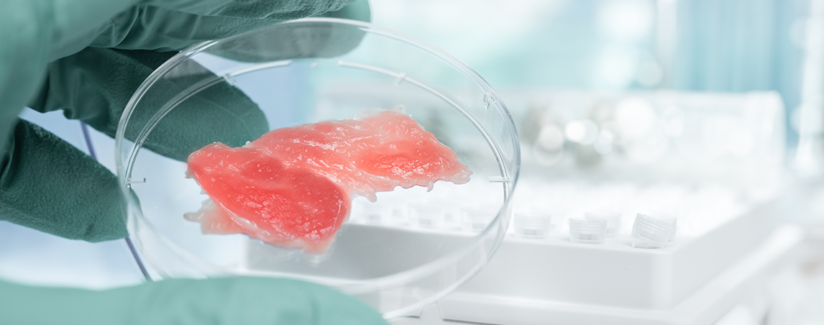
Is Cultured Meat in Our Future?
A few companies are vying to create “cultured meat” — beef, chicken and seafood engineered in laboratories to taste like the real thing. The Food and Drug Administration held a meeting to receive public feedback on labeling of the product.
Lab-grown meat is seen by some as a way to meet rising global demand for protein while addressing concerns with modern livestock and poultry production methods. There will be questions about whether synthetic meat is healthy and safe – is fake meat good for us? A poll found that consumers want cultured meat to be clearly labeled. The concept also prompts societal and ethical questions.
We sought social and ethical perspectives from three experts:
- Candace Croney, professor in the departments of Comparative Pathobiology and Animal Sciences and Director of the Center for Animal Welfare Science at Purdue University, is the primary author of a paper titled, “Engineering Approaches to Animal Welfare,” currently under review at the Journal of Agriculture and Environmental Ethics. One section of the study addresses the issue of using the tissue of live animals to produce a synthetic meat product.
- Gary Varner, a philosophy professor at Texas A&M University, lists animal welfare and environmental ethics as research interests.
- Raymond Anthony, philosophy professor at the University of Alaska Anchorage, has done research in the areas of environmental, food, animal and agricultural ethics.
What are the potential benefits of a synthetic meat product?
Dr. Croney: There is the idea that we could vastly mitigate any suffering that animals experience as a result of being raised for meat. One thing to keep in mind is that we would still need live animals as progenitors of the tissue that would be used to culture meat. Their experiences, the conditions under which they are raised, handled and sampled for tissue biopsies, and their overall welfare needs would have to be addressed. But, significantly fewer animals would be needed and the thinking by proponents of the technology is that this would also result in a significant reduction in the environmental impacts of livestock production.
Dr. Varner: The main one is an improvement in animal welfare by removing sentient beings that are capable of suffering from the food system. People might also think that the process could potentially be made more cost-efficient and also avoid environmental impacts of contemporary meat systems. I don’t know if that’s realistic or not.
Dr. Anthony: The meat we consume and the way we farm it have been scrutinized more than ever in recent years. Synthetic meat production is potentially another way to create a sustainable food future. As we approach 2050, scientific and technological innovations such as precision farming and genetic engineering, and now synthetic meat production, are being tasked to feed the projected 9 billion people and to do so in ways that mitigate such issues as greenhouse gas emissions, overfishing and animal welfare concerns. We face an enormous challenge to produce more food and meet the projected future needs for animal protein using existing agricultural lands and current water and energy resources.
What are the societal and cultural implications?
Dr. Croney: Is growing meat in a laboratory socially acceptable to people? We don’t know that yet. People who lean toward “natural” products might have questions about growing meat in a laboratory instead of using more traditional practices. We know many people today are very sensitive about the technologies associated with food production – particularly anything that looks like genetic modification as people tend to be very risk averse. Will this technology be similarly worrisome to people? What information will be provided to the general public here and elsewhere in the world? When and by whom will that be offered so that people can make informed choices that align with their values and beliefs rather than feeling that technology is being foisted on them? To the extent that technology advances might make it difficult to economically and visually distinguish cultured meat from traditionally produced meat, will cultured meat products be labeled in such a manner as to facilitate consumer choice? If the products are nutritionally different or vary significantly in price, who will have access to them and how does this mitigate or worsen societal inequities?
What happens to rural communities and all the people who are directly or indirectly involved in animal agriculture? It’s a way of life that’s important to many people. Is it socially acceptable to do something that could disrupt or displace that way of life? As consumers have increasingly expressed a desire to know more about how food is produced and to feel connected to farming, will this type of meat production exacerbate existing tensions and areas of disconnect between those who produce food and those dependent on them as consumers?
Dr. Varner: Reduction in animal-based agriculture via synthetic meat, as well as through synthetic dairy products, reduces a traditional lifestyle and relationship with animals that pastoralists celebrate.
Dr. Anthony: I see three areas of concern:
- Philosophically, how do synthetic meat production practices enhance our relationship to animals and the environment? Does “clean meat” production, which occurs in sterile laboratories, alienate us further from the natural world and strain human-animal relationships?
- Sophisticated consumers and regulators want to know if they are getting what is being marketed by these companies. How start-up tech companies foraying into food production address trust and transparency as part of an accountable business model will be a central issue to watch.
- The impact of synthetic meats on issues of justice, fairness and equity for all the stakeholders in the food chain (animal and the environment included) will also be of interest. For example, it will be important to understand just how the public perceives the extent to which this evolving technology will mitigate animal suffering and how new actors in the food system balance this ethical concern against other ethical expectations and risk considerations related to food norms and cultural practices about what is acceptable to do. Also, like any technological use, there will be tradeoffs. How will this technology, if it becomes a viable competitor to conventional production practices, impact farmers the world over who rely on animal protein production for their livelihoods, community and food security?
What is the feasibility of cultured meat – is the technology there yet?
Dr. Anthony: At the moment, there are only a handful of global start-ups working on high-tech meat alternatives. They include Memphis Meats, Hampton Creek, and Beyond Meat. Food safety concerns, accusations of manipulation and adulteration, labeling regulations, and the legacy of how GM foods were rolled out are among some of the hurdles that must be addressed and surpassed.
Dr. Varner: I don’t know how close the proponents of this technology are to being able to scale this up to commercial levels.
Dr. Croney: There has been proof of concept. Tissue-cultured meat has actually been produced and there have been “tastings.” What is not known is whether it can be produced in a way that meets consumer expectations of what meat should look like and how it tastes. The logistics of doing it on a large scale and affordably has not been demonstrated yet.
Do you think laboratory meat production is realistic?
Dr. Croney: There’s a lot of promise. In terms of doing it on a large-scale basis at this point in time, I’m not sure. The economics need to be fundamentally addressed and who would invest in it? Do I see this realistically happening in the next 20 years? No, but we will see efforts to improve the technology and I think there could be benefit from that.
How would you summarize this issue?
Dr. Anthony: Beyond issues of taste, safety, healthfulness and cost, consumers are increasingly interested in flexing their citizenship muscles to co-shape a global sustainable food future. Public attitudes toward the ethical acceptability of synthetic meats will depend heavily on the extent to which the potential of this innovation can live up to the marketing hype and the technology and its applications do not result in worse-off outcomes for people, the planet and animals. When framing questions about the morality of synthetic meats, empirical studies gauging public concern and expectations will be key. Fundamentally, will this technological innovation enhance human-animal-environmental relationships or harm them? Will there be an improvement over conventional practices?
Dr. Croney: We know that global demand for meat is increasing as income levels rise in developing countries. Tissue-grown meat has the potential to help satisfy demand while addressing environmental concerns associated with the additional land and natural resources that would be required to increase conventional livestock production. In short, the base technology needed to produce laboratory meat is there and appears promising, but the logistics and economics of doing it on a large scale while meeting consumer expectations for taste, naturalness, and healthfulness need to be better understood.
Dr. Varner: One thing that isn’t raised by your questions is that as sentient animals are removed from the meat sector then, other things equal, there are fewer animals living on earth. And, if the lives of the animals that are not living would have been good, there is less aggregate happiness in the world.
Lab-grown meat produced from tissues is being researched and tested, but there are still many questions to be answered, including if consumers will accept the new product.
Originally published August 23, 2017.




























